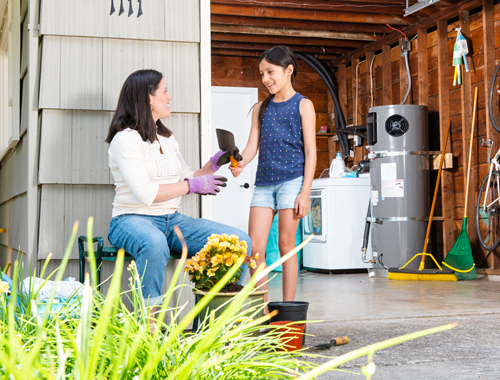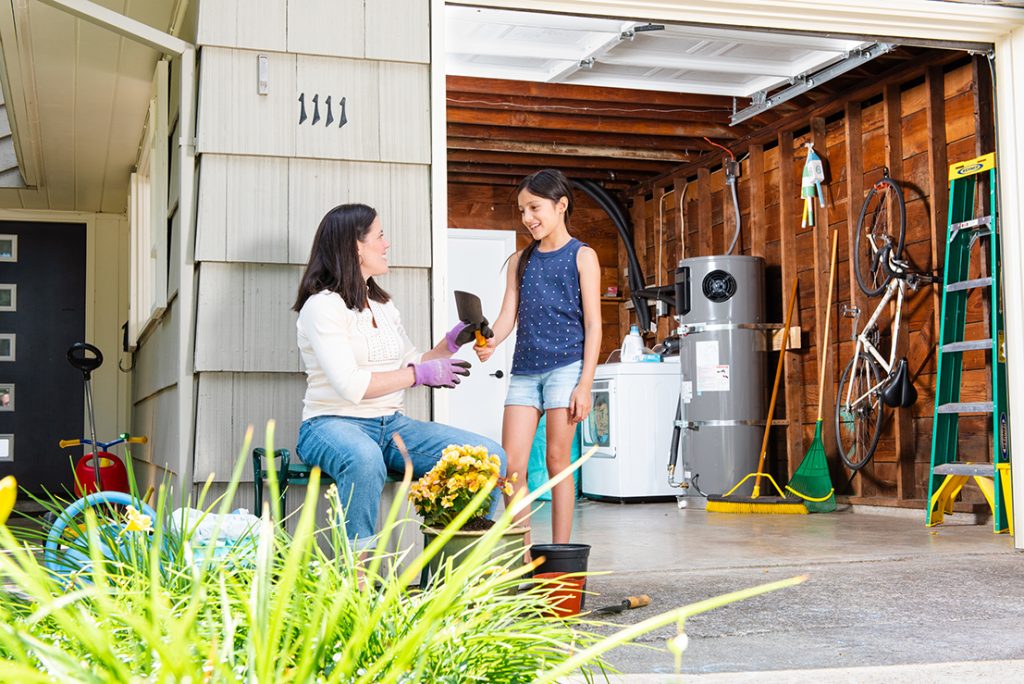
24 May Let’s Be Proactive: Moving the Needle on Heat Pump Water Heater Adoption

Photo courtesy of Northwest Energy Efficiency Alliance (NEEA)
BY MADDIE SLIGH, D+R INTERNATIONAL
Heat pump water heaters (HPWH) are the future of water heating, with local jurisdictions promoting all-electric buildings and a new national effort to accelerate this market transformation. But at just 2% market share today, there’s a long way to go.
Energy efficiency programs have focused heavily on emergency replacement, recognizing that most people don’t think about their water heater until it fails. Water heaters have an expected lifespan of about 10 to 13 years meaning that all water heaters that are currently installed in the U.S. could potentially fail by the year 2034. But why wait until a failure to replace it? Most households will start saving energy (and money!) right away with a HPWH.
Planned replacements can be a useful tool for installers and contractors looking to boost their HPWH sales and there are many proactive sales strategies that these parties should incorporate into their existing practices in order to capture these sales.
Benefits of HPWHs
HPWHs benefit homeowners, renters, utilities, and contractors. HPWHs are two to four times more efficient than common approaches to providing hot water which means that homeowners and renters can save hundreds of dollars on their energy bills annually depending on the time of use and local energy costs. The efficiency of these appliances allows utilities to delay costly infrastructure and generation upgrades that would be needed if more energy consumptive appliances continued to be installed in their territories. Research conducted by the Northwest Energy Efficiency Alliance (NEEA) shows that HPWH customers have a 93% satisfaction rate meaning that they would, or have already, recommended the technology to friends and family. This could also translate to benefit contractors who are seeking referrals from satisfied customers. Installers and contractors can additionally benefit from the higher upfront cost of HPWHs compared to other water heating technology. This can result in higher profit margins on water heater sales which in turn allows for flexibility when it comes to meeting sales quotas.
Planned Replacements
Definitions:
Planned Replacement – a water heater replacement that takes place before the appliance has failed.
Emergency Replacement – a water heater replacement that takes place when the appliance no longer functions or is leaking.
While the benefits of HPWHs are clear, there are a lot of lost opportunities when planned replacement sales aren’t utilized. According to observations made in NEEA’s service territory, water heaters fail at a rate of about 8% annually meaning that they have an average expected life of 12-13 years. Purchase decisions do not need to be instantaneous, instead, consumers can plan to replace their water heaters with HPWHs before their water heater fails. It is important to keep in mind that water quality (mineral content), average ground water temperatures, and proper maintenance can all affect the heater’s performance and life expectancy. Overall, planned replacements offer an opportunity to replace the existing stock of water heaters at a quicker rate than the water heater failure rate and more successfully than if HPWHs were only introduced in an emergency replacement scenario.
Consumers with working water heaters could have a variety of reasons to replace their existing water heater before it fails, including:
- Deal with it on your schedule and save stress of an emergency.
- Get a more efficient unit and start savings money right away, especially for households with four or more occupants.
- Have contractors already working on another project, like a remodel or other plumbing service.
- Want to do your part to fight climate change.
Targeting these planned replacement opportunities helps in developing sales techniques to capture these customers.
Proactive Sales
There are several opportunities to discuss HPWHs with prospective customers. Customer facing employees that work for installers and contractors, such as phone reps, service technicians, and sales associates, can be trained to talk about HPWHs with customers. Here are some examples of how these parties can introduce HPWHs into the conversations they are already having:
- Ask qualifying questions of customers.
- Communicate HPWH benefits to customers with aging water heaters.
- Evaluate the water heater’s condition while in a home for other repairs.
- Email HPWH information ahead of estimator visits to help inform and shape the customer’s mindset.
- Follow up with existing customers whose water heater was identified previously as needing replacement.
- Demonstrate knowledge about local incentives.
There are an abundance of opportunities for installers and contractors to expand their sales beyond emergency replacements. During the COVID-19 pandemic, there have not been as many opportunities for in-person, proactive selling as there have been historically due to social distancing and stay at home orders. As in-person contact becomes safer with the COVID-19 vaccine rollout, it is a great time to target planned replacement opportunities, expand HPWH training for customer facing employees, and ultimately to transform the existing stock of water heaters.

